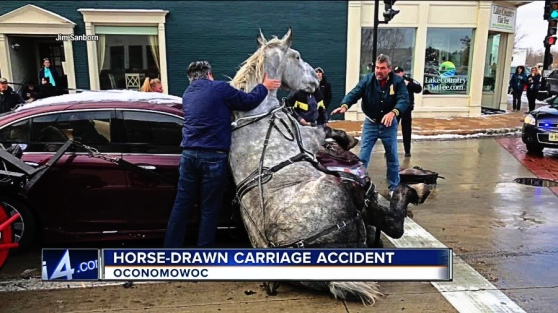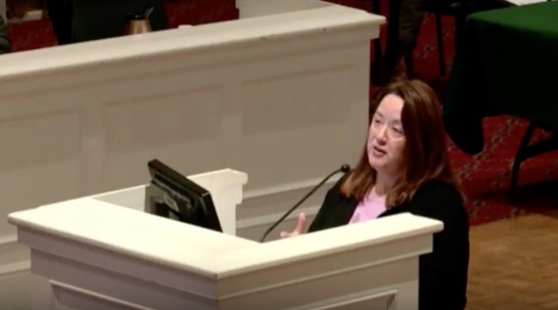A draft of the new horse carriage regulations is here, and it doesn’t look good.
Individual horses are not identified. Carriages can continue to operate up to and including temperatures of 95 degrees and at a heat index up to and including 105 degrees. There are no provisions for rest and water breaks; no rules about how many hours a horse can be worked in a day, or how many days a horse can be worked in a week.
These rules not NOT good enough! Here’s a quick comparison:
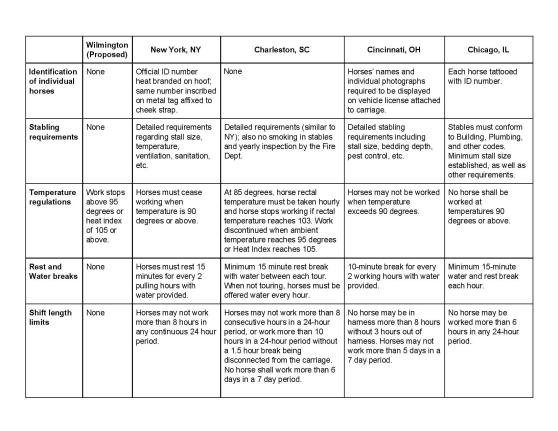

We need to let city leaders know that these rules do not do enough to protect horses. Email the mayor and councilors at council@wilmingtonnc.gov. Also sign up to SPEAK about this issue at the TUESDAY, AUG. 7 city council meeting, where the vote will be taken! Forms must be submitted by NOON, MONDAY AUG. 6. If you cannot get downtown to submit a speaker form, contact the mayor (910.341.7815) to see if late forms will be allowed. It is not fair to put the information out to the public at 9am and give people only 3 hours to get downtown and fill out paperwork to speak.
Below is the proposed new city code, in full. You’ll see that most of the rules are NOT about animal safety or welfare:
DIVISION 4. – HORSE-DRAWN VEHICLES FOR HIRE.
In addition to all other requirements in this Article, horse-drawn vehicles for hire are also subject to all restrictions and requirements of this Division.
Sec. 4-212. – Markings for horse-drawn vehicles for hire.
- Every horse-drawn vehicle for hire within the city of Wilmington shall have a sign plainly affixed on each side of the vehicle or, if space is limited on the sides, then on the rear of the vehicle, in letters not less than four inches high, markings containing the full name of the company operating the horse-drawn vehicle for hire.
- There shall be affixed on each side and on the rear of each horse-drawn vehicle for hire a number at least six inches high, the number to be a separate and distinct number from that on any other vehicle for hire within the city. The number shall be assigned to such horse-drawn vehicle for hire and the owner thereof by the city manager or his designee and shall not be altered or changed without the consent of the city manager or his designee.
Sec. 4-213. – Additional Requirements.
- Restricted days, locations, and times. Below are listed specific sections of the city in which all tour guides and horse-drawn carriage companies shall not operate at certain times or under certain conditions. Restricted areas include:
-
-
- No horse-drawn vehicle for hire shall be operated on any portion of any city street where the speed limit on that portion of the street is greater than 35 m.p.h.; and
-
-
-
- No horse-drawn vehicle for hire shall be operated on city streets between the hours of 1:00 a.m. and 3:00 a.m. on any day; and
-
-
-
- No horse-drawn vehicle for hire shall be operated on city streets between the hours of 6:30 a.m. and 8:30 a.m., Monday through Friday, year-round; such restriction shall not apply on legal holidays; and
-
-
- No horse-drawn vehicle for hire shall be operated on Market Street east of 8th Street at any time year-round except for the purpose of crossing from one side of the street to the other; and
-
- No horse-drawn vehicle for hire shall be operated on 3rd Street from 8:30 a.m. to 6:00 p.m. year-round except for the purpose of crossing from one side of the street to the other; and
-
-
- No horse-drawn vehicle for hire shall be operated on Front Street between the hours of 4:30 p.m. and 5:30 p.m., Monday through Friday, year-round, except for the purpose of crossing the street; such restriction shall not apply on legal holidays; and
-
-
-
- The city manager or his designee may place additional restrictions on, or make temporary modifications to, the days, locations, or times of operation for horse-drawn vehicles for hire, at any time based upon the needs of the city, by providing oral and/or written notice to all permitted operators of horse-drawn vehicles for hire within the city. Additional restrictions may include but are not limited to temporarily relocating carriage loading zones or temporarily shutting down horse-drawn carriage operations completely, as the situation requires.
-
- Every horse-drawn vehicle for hire operating within the city shall be equipped with the following:
-
- Lanterns, reflectors, or electrically powered lights that shall be visible from a distance of 500 feet in any direction. Each animal shall have reflective ankle cuffs or other reflective material on the front of the animal. Each side of the shaft or harness in contact with the animal shall have reflective material. Lights and reflective material shall be in operation from a half hour after sunset until a half hour before sunrise, or when raining, or when inclement weather or environmental conditions impair the ability to clearly discern persons and vehicles on the streets or highways at a distance of 500 feet; and
-
- A diapering apparatus that prevents the droppings of the animal from being deposited on the ground or the right-of-way.
- It shall be unlawful for any horse-drawn vehicle for hire to willfully impede the normal flow of traffic on any city street, alley, or thoroughfare at any time. Horse-drawn vehicles for hire shall, as soon as it can be done safely, pull to the nearest curb area when one or more vehicles are unable to safely pass or continue in normal traffic flow.
- An annual certificate of serviceability shall be issued for each animal used for a horse-drawn vehicle for hire in which a licensed veterinarian shall certify, after due and proper inspection, the good health of each animal before being placed into service. Such annual certificate shall be provided to the city manager or his designee at least thirty (30) days prior to the date set for annual re-issuance of the horse-drawn vehicle for hire operating medallion.
- No animal shall be subject to any condition or treatment, whether in service or out of service, which will impair the good health and physical condition of that animal.
- Horse-drawn vehicles for hire shall not operate within the city when the actual air temperature exceeds 95 degrees Fahrenheit, or when the heat index is 105 degrees Fahrenheit or higher. Temperature and heat index readings are based upon current conditions at the Wilmington International Airport, as determined by the National Weather Service.
- Horse-drawn vehicles for hire shall not operate within the city when either the actual temperature or the wind chill factor are below 32 degrees Fahrenheit. Temperature and wind chill readings are based upon current conditions at the Wilmington International Airport, as determined by the National Weather Service.
- Horse-drawn vehicles for hire shall be generally operated with the horse gait at a walk. A trot may be used when necessary, but caution should be used, as safety of passengers and the animals is a paramount concern when trotting on pavement, asphalt, brick, or concrete. Cantering on these surfaces is dangerous and should only be used in an emergency.
- Horse-drawn carriage operators are required to regularly wash their animals and, to the best of their abilities, ensure the cleanliness of their animals at all times.
- To the extent that they are able to do so, horse-drawn carriage operators shall use all reasonable efforts to prevent horses from urinating on city streets at locations other than in their assigned carriage loading zones.
- Failure to comply with this Article, or any laws, ordinances, or regulations of this city or state relating to vehicles and/or vehicles for hire, and also including but not limited to any law, ordinance, or regulation governing the treatment of animals, may result in revocation by the city manager of some or all of the operating medallions issued to the horse-drawn carriage company.
- Each horse-drawn carriage company shall implement a structured training program for both the drivers/tour guides and the horses to ensure proficiency when operating on the public right-of-way. Proof of training and a copy of training materials and records shall be provided to the city manager or his designee on an annual basis and shall also be made available upon request for inspection at any other time by the city manager or his designee.
Sec. 4-214. – Prohibited business practices.
Operators of horse-drawn vehicles for hire are prohibited from employing any of the following business practices on city streets, sidewalks, or rights of way:
- The distribution of pamphlets or other printed materials to solicit or advertise for business, other than when specifically requested to be provided by members of the public.
- The use of hawkers, pullers-in, pamphleteers, or persons holding signs to solicit or advertise the business or inviting the public to make inquiries to such persons. In addition to activity on city streets, sidewalks, or rights of way, this provision also applies to private property adjacent to any such streets, sidewalks, or rights of way but directed at persons on such streets, sidewalks, or rights of way.
- The placement of fixed structures for the purpose of sales, solicitation, hawking, pullers-in, pamphleteering or the support of signage or advertising.
- The parking or storage of animals or equipment on the public streets and sidewalks, except to load or unload passengers, horses, or vehicles in approved loading zones. Nothing herein shall regulate the parking or storage of animals or equipment on private property.
Sec. 4-215. – Standard Operating Medallion Issuance, Fees, and Carriage Loading Zones.
- There are seven (7) standard operating medallions available for operation of horse-drawn vehicles for hire within the city, and they will be awarded by the city manager or his designee on a first-come, first-served basis, based upon the date on which each horse-drawn carriage company began to legally operate within the city.
- Medallions may be transferred between different horse-drawn vehicles for hire belonging to the same horse-drawn carriage company at any time by the owner/operator of the horse-drawn carriage company without the need for further approval from the city. Medallions are not transferable from one horse-drawn carriage company to another. The medallion remains the property of the city and shall only be surrendered to the city manager or his designee.
- Each horse-drawn carriage company may be awarded up to four (4) standard operating medallions, restricting the number of horse-drawn vehicles for hire in operation by any one horse-drawn carriage company at one time to four (4) horse-drawn vehicles for hire.
- For each standard operating medallion issued within the city, the horse-drawn carriage company possessing that medallion shall be assessed an annual fee per medallion, as set forth in the city’s fee schedule.
- Standard operating medallions shall only be issued after the owner/operator of a horse-drawn carriage company has provided the city manager or his designee with a complete listing of all potential regular routes that the horse-drawn vehicles for hire owned by that horse-drawn carriage company intend to take, and such routes have been approved by the city manager or his designee, after consultation with any appropriate city staff.
- Any changes in regular routes, other than changes resulting from unexpected conditions such as road closures or street maintenance, must be approved by the city manager or his designee prior to operation along the altered route.
- For private charters when a horse-drawn vehicle for hire displaying a medallion is not beginning or ending a route at a designated carriage loading zone, documentation regarding such private charters, including but not limited to the route taken, the date and time of the charter, and the beginning and ending points for the charter, must be kept and maintained by each horse-drawn carriage company for a period of one (1) year, and must be made available for inspection by the city manager or his designee upon their request at any time.
- All operating medallions shall be issued by the city manager or his designee and visibly displayed on the back of the horse-drawn vehicle for hire.
- Only horse-drawn vehicles for hire displaying a medallion may load and discharge passengers in areas of the city that are specifically designated as a “carriage loading zone,” as those areas are designated in Official Traffic Schedules of the city of Wilmington. Horse-drawn vehicles for hire not displaying a standard operating medallion are not allowed in any carriage loading zone.
- Horse-drawn vehicles for hire not displaying a standard operating medallion are not allowed to load and/or unload passengers within the city limits at any time.
- Each horse-drawn carriage company that is awarded a standard operating medallion for operation within the city will be allowed to choose a location for their base of operations from the list of on-street carriage loading zone options listed in the city’s Official Traffic Schedules. On-street carriage loading zones will be assigned on a first-come, first-served basis, based upon the date on which each horse-drawn carriage company began to legally operate within the city. Once a location is chosen by the first company in operation, the next company will choose from the remainder of the available locations on the list, and continue in such fashion until all horse-drawn carriage companies have chosen a location. If one horse-drawn carriage company ceases operation and/or no longer requires use of its chosen carriage loading zone location, that location will be offered to the remaining horse-drawn
carriage companies in operation in the order of when those companies began legally operating in the city.
- Each horse-drawn carriage company that chooses to operate out of an approved carriage loading zone location is required to keep that location clean and sanitized from all horse waste and debris during all periods of operation.
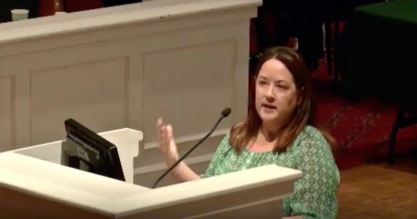
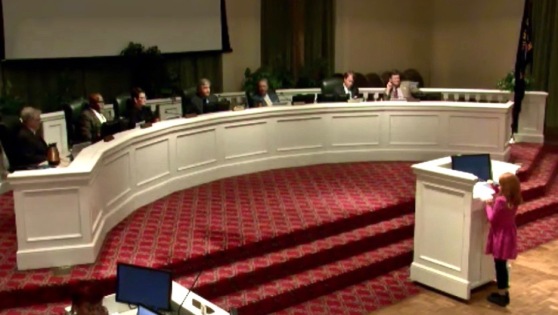

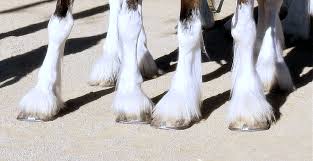



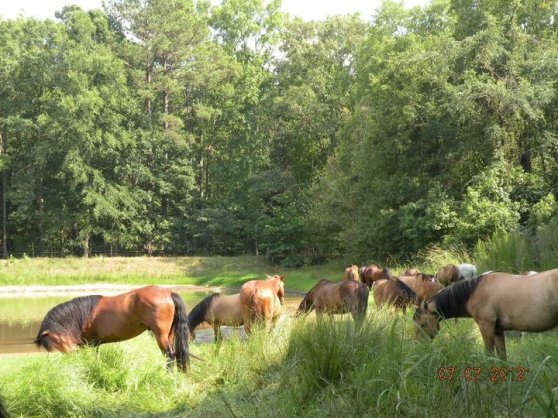
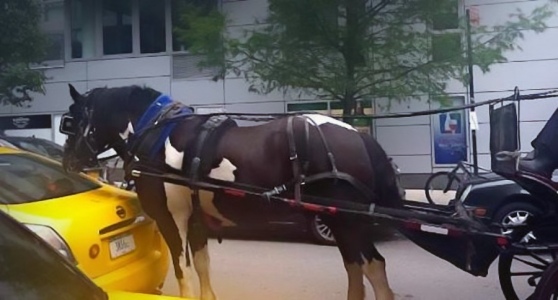 I wasn’t sure what I wanted to do, but I knew I had to do something. Since it was near the end of the year and people were busy with holiday preparations, I decided to wait until the new year before taking action. I did put a link to the news story on the awesome
I wasn’t sure what I wanted to do, but I knew I had to do something. Since it was near the end of the year and people were busy with holiday preparations, I decided to wait until the new year before taking action. I did put a link to the news story on the awesome 